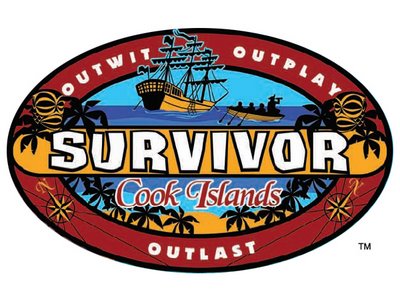 To my friends who read this blog, you’ve heard this rant before (I can see your eyes glazing over just from reading the title of this post). But, in some ways, this rant is inevitable. After a five-or-so-year hiatus from the series (is it really the 13th rendition?!), I’ve started watching again. Heh, it’s been about as long since I’ve written about it. So, perhaps I’m due. Truth be told, I just can’t help myself:
To my friends who read this blog, you’ve heard this rant before (I can see your eyes glazing over just from reading the title of this post). But, in some ways, this rant is inevitable. After a five-or-so-year hiatus from the series (is it really the 13th rendition?!), I’ve started watching again. Heh, it’s been about as long since I’ve written about it. So, perhaps I’m due. Truth be told, I just can’t help myself:When Survivor first came out, I wasn’t going to watch but one episode, write a scathing review and be done with it. But then I saw season one contestant Dirk Been pull out his Bible and talk about his faith. I was hooked. A Christian playing a game for a million bucks. How would he do? Would he live his talk? And how would he play the game?
That last question is the one ended up driving my ongoing fascination with the series. Why? Because I think Survivor is more than a game. I think the show reveals how the contestants (and the viewers) approach life.
Many contestants play by the philosophy that second season runner up Colby Donaldson espoused: “You have to switch hats in this game,” he said in an in-season reflection. “Sometimes you wear a white hat, sometimes a black hat. Hopefully by the end of the game you’ve worn a white hat more of the time than a black hat.”
But that’s not only a way many play Survivor—it’s a way many approach life. In the name of competition, business, and protecting one’s own, people often excuse and justify unethical behavior.
On the other hand, another second season contestant (and self-confessed Christian), Roger Bingham, reflected: “I hope whoever won will have played as morally and ethically as physically possible.” He reflected his words in his own actions. At one point, another contestant asked Bingham who needed the money more, he or Elisabeth Filarski (now Elisabeth Hasselbeck and co-host of The View). Bingham answered straightforwardly that Filarski needed it more, essentially sealing his fate to be the next one voted off. The money wasn’t the most important thing to him; his integrity (and faith) was.
During that second season, I began to ask questions to people who watched the show: How would you play? Would you play to win? How would you treat people? How would you talk with them? Would you lie?
Many people—both Christian and not—say they would approach Survivor the same way they would sports or a card game: “You play to win. It’s just a game.” What about lying and misleading people? “Well, it’s part of the game,” many answered. “Or it’s just like business—sometimes the next guy gets hurt.”
Ouch.
When we reduce something to a game—or “just business”—we run the risk of taking God out of it. We may find ourselves saying, “This is separate from the rest of my life, and I don’t need to apply my faith here.” Then we box it up, put it on a shelf and take it down when we are done. But Jesus isn’t part of our life—he is our life. Our faith consists of a constant relationship with him—there’s no boxing him up and putting him on a shelf. He’s our every-minute source of life.
In addition, when we reduce something to a game, we reduce people to objects or obstacles—how much value they have to the tribe or how much of a threat they are to us winning the game. And that’s a contrary philosophy to the one in Scripture: “Now the body is not made up of one part but many . . . those parts of the body that seem to be weaker are indispensable, and the parts that we think are less honorable we treat with special honor” (1 Cor. 12:14, 22-23).
 And it was something along these lines that leads up to my rant this season. In the second episode last Thursday, I watched the Aitutaki tribe decide to throw a challenge so they would lose and have to go to tribal council and vote off a team member. Why? Because some of them deemed heavy-metal guitarist Billy invaluable (because he was “useless” and didn’t pull his weight) and wanted him out of the game.
And it was something along these lines that leads up to my rant this season. In the second episode last Thursday, I watched the Aitutaki tribe decide to throw a challenge so they would lose and have to go to tribal council and vote off a team member. Why? Because some of them deemed heavy-metal guitarist Billy invaluable (because he was “useless” and didn’t pull his weight) and wanted him out of the game.Agendas like that tick me off. Even if Billy was lazy and couldn’t find his place, we don’t treat people like that. There’s a better way to deal with those issues—there’s a better way to relate with people. And seeing agendas like that play out in Survivor just accentuates for me the times I’ve witnessed it in everyday life. The idea of working behind someone’s back to their detriment (even if they are lazy or unlikable) plays out all too often in business, social circles and even church. When we operate with agendas like this—under the guise of “it’s best for the team”—we break down trust, relationships and people’s spirits.
But, many would argue, Billy (who was indeed voted off at the end of the episode) agreed to play the game. And he wasn’t pulling his weight. It’s part of the game.
So, what? Does that change how we are called to live? Does that change how we are called to treat others? Jesus—who’s the one who calls us, who is our life—is the one by which we judge every single action, thought, and motivation, be it our family life, business life, or competing in a game like Survivor. There is no such thing as “just a game.” There is no such thing as “just business.” There is only Jesus, our life in him, and how we live that life with others. And hidden agendas aren’t part of that life—be it in Survivor or everyday life.
 I was both heartened by and sympathetic to the struggle played out by Aitutaki tribe member Cristina (who hints in her bio that she is a Christian) during the episode. While she voted Billy off in the end, she was disturbed by the line of action advocated by other tribe members, especially Ozzy. And, indeed, trust was broken: “"I still think that we should all work as a team,” she says during the episode. “It's disappointing and I don't know if I can trust Oscar anymore."
I was both heartened by and sympathetic to the struggle played out by Aitutaki tribe member Cristina (who hints in her bio that she is a Christian) during the episode. While she voted Billy off in the end, she was disturbed by the line of action advocated by other tribe members, especially Ozzy. And, indeed, trust was broken: “"I still think that we should all work as a team,” she says during the episode. “It's disappointing and I don't know if I can trust Oscar anymore."I’m not saying we should overlook or not confront lazy behavior or problems in work or social relationships. But there’s a better way to play the game. There’s a better way to live life, don’t you think?
My .02 worth rant, anyway.
(Images: CBS/Wikipedia) miscctgy